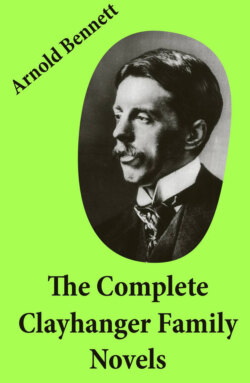Читать книгу The Complete Clayhanger Family Novels (Clayhanger + Hilda Lessways + These Twain + The Roll Call) - Arnold Bennett - Страница 129
На сайте Литреса книга снята с продажи.
Five.
Оглавление“Seen my latest, Charlie?” asked Tom, in his thin voice.
“No, what is it?” Charlie replied. The younger brother was flattered by this proof of esteem from the elder, but he did his best by casualness of tone to prevent the fact from transpiring.
All the youths were now standing in a group in the middle of the drawing-room. Their faces showed pale and more distinct than their bodies in the darkening twilight. Mrs Orgreave, her husband, and the girls had gone into the dining-room.
Tom Orgreave, with the gestures of a precisian, drew a bunch of keys from his pocket, and unlocked a rosewood bookcase that stood between the two windows. Jimmie winked to Johnnie, and included Edwin in the fellowship of the wink, which meant that Tom was more comic than Tom thought, with his locked bookcases and his simple vanities of a collector. Tom collected books. As Edwin gazed at the bookcase he perceived that it was filled mainly with rich bindings. And suddenly all his own book-buying seemed to him petty and pitiful. He saw books in a new aspect. He had need of no instruction, of no explanation. The amorous care with which Tom drew a volume from the bookcase was enough in itself to enlighten Edwin completely. He saw that a book might be more than reading matter, might be a bibelot, a curious jewel, to satisfy the lust of the eye and of the hand. He instantly condemned his own few books as being naught; he was ashamed of them. Each book in that bookcase was a separate treasure.
“See this, my boy?” said Tom, handing to Charlie a calf-bound volume, with a crest on the sides. “Six volumes. Picked them up at Stafford— Assizes, you know. It’s the Wilbraham crest. I never knew they’d been selling their library.”
Charlie accepted the book with respect. Its edges were gilt, and the paper thin and soft. Edwin looked over his shoulder, and saw the title-page of Victor Hugo’s “Notre–Dame de Paris,” in French. The volume had a most romantic, foreign, even exotic air. Edwin desired it fervently, or something that might rank equal with it.
“How much did they stick you for this lot?” asked Charlie.
Tom held up one finger.
“Quid?” Charlie wanted to be sure. Tom nodded.
“Cheap as dirt, of course!” said Tom. “Binding’s worth more than that. Look at the other volumes. Look at them!”
“Pity it’s only a second edition,” said Charlie.
“Well, damn it, man! One can’t have everything.”
Charlie passed the volume to Edwin, who fingered it with the strangest delight. Was it possible that this exquisitely delicate and uncustomary treasure, which seemed to exhale all the charm of France and the savour of her history, had been found at Stafford? He had been to Stafford himself. He had read “Notre–Dame” himself, but in English, out of a common book like any common book—not out of a bibelot.
“You’ve read it, of course, Clayhanger?” Tom said.
“Oh!” Edwin answered humbly. “Only in a translation.” Yet there was a certain falseness in his humility, for he was proud of having read the work. What sort of a duffer would he have appeared had he been obliged to reply ‘No’?
“You ought to read French in French,” said Tom, kindly authoritative.
“Can’t,” said Edwin.
“Bosh!” Charlie cried. “You were always spiffing in French. You could simply knock spots off me.”
“And do you read French in French, the Sunday?” Edwin asked.
“Well,” said Charlie, “I must say it was Thomas put me up to it. You simply begin to read, that’s all. What you don’t understand, you miss. But you soon understand. You can always look at a dictionary if you feel like it. I usually don’t.”
“I’m sure you could read French easily in a month,” said Tom. “They always gave a good grounding at Oldcastle. There’s simply nothing in it.”
“Really!” Edwin murmured, relinquishing the book. “I must have a shot, I never thought of it.” And he never thought of reading French for pleasure. He had construed Xavier de Maistre’s “Voyage autour de ma Chambre” for marks, assuredly not for pleasure. “Are there any books in this style to be got on that bookstall in Hanbridge Market?” he inquired of Tom.
“Sometimes,” said Tom, wiping his spectacles. “Oh yes!”
It was astounding to Edwin how blind he had been to the romance of existence in the Five Towns.
“It’s all very well,” observed Charlie reflectively, fingering one or two of the other volumes—“it’s all very well, and Victor Hugo is Victor Hugo; but you can say what you like—there’s a lot of this that’ll bear skipping, your worships.”
“Not a line!” said a passionate, vibrating voice.
The voice so startled and thrilled Edwin that he almost jumped, as he looked round. To Edwin it was dramatic; it was even dangerous and threatening. He had never heard a quiet voice so charged with intense emotion. Hilda Lessways had come back to the room, and she stood near the door, her face gleaming in the dusk. She stood like an Amazonian defender of the aged poet. Edwin asked himself, “Can any one be so excited as that about a book?” The eyes, lips, and nostrils were a revelation to him. He could feel his heart beating. But the girl strongly repelled him. Nobody else appeared to be conscious that anything singular had occurred. Jimmie and Johnnie sidled out of the room.
“Oh! Indeed!” Charlie directed his candid and yet faintly ironic smile upon Hilda Lessways. “Don’t you think that some of it’s dullish, Teddy?”
Edwin blushed. “Well, ye-es,” he answered, honestly judicial.
“Mrs Orgreave wants to know when you’re coming to supper,” said Hilda, and left.
Tom was relocking the bookcase.
